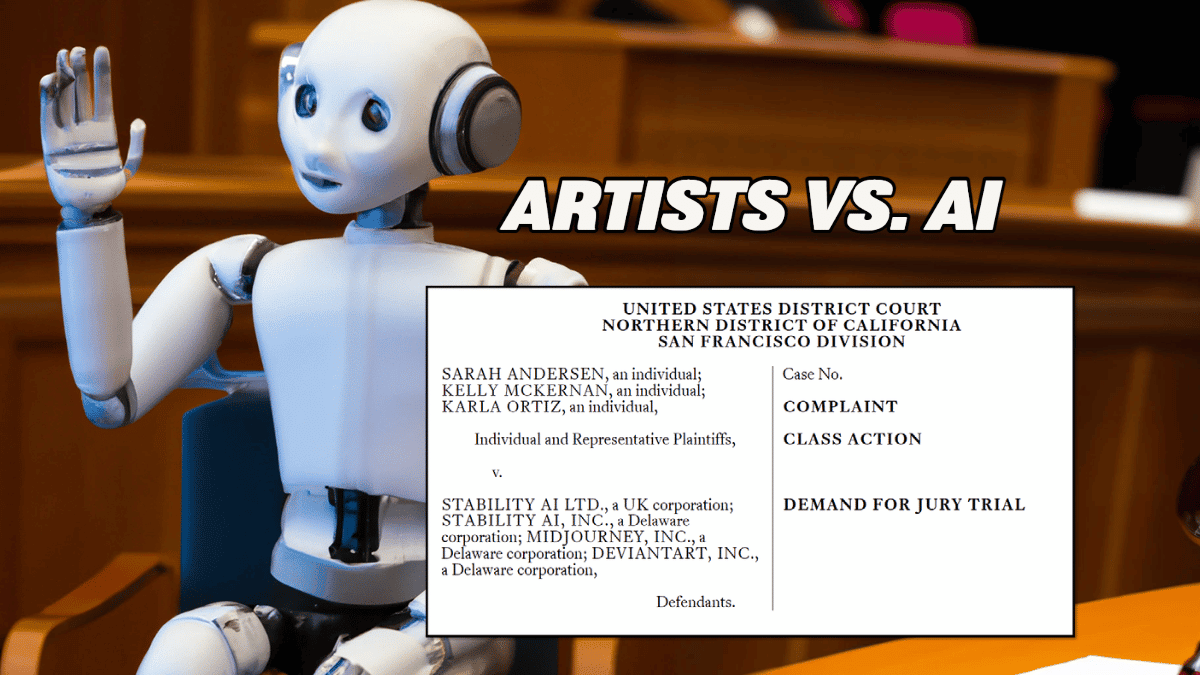Best AI Tools for Your Lawsuit: Revolutionize Your Case
The best AI tools for your lawsuit include Legal Robot and Casetext. These tools streamline legal research and document analysis.
Navigating a lawsuit can be challenging, but AI tools can simplify the process. With advanced algorithms, these platforms help attorneys and clients access information quickly. They provide insights into legal precedents and offer document review features. Using AI in legal contexts enhances efficiency and accuracy, saving time and resources.
As technology advances, incorporating AI tools in your legal strategy becomes increasingly essential. Lawyers can leverage these tools to improve case outcomes while reducing costs. Understanding the available options can empower you to make informed decisions during your legal journey. Embrace the future of law with these innovative resources at your disposal.
Introduction To AI In The Legal Sphere
Artificial Intelligence (AI) is changing the legal world. Lawyers and firms use AI tools to improve their work. These tools can save time, reduce costs, and increase efficiency. They help in various stages of lawsuits. Understanding AI in law is essential for modern legal practices.
The Rise Of AI In Law
AI technology is growing rapidly in the legal field. Here are some key points:
- AI can analyze large data sets quickly.
- It helps lawyers find relevant case law.
- AI tools assist in drafting legal documents.
- They offer predictive analysis for case outcomes.
Many law firms now rely on AI. They use it to gain a competitive edge. AI tools streamline legal research and document review. This shift improves productivity and client satisfaction.
Potential Benefits For Legal Cases
AI tools provide several benefits for legal cases:
| Benefit | Description |
|---|---|
| Efficiency | AI speeds up research and document preparation. |
| Cost-effective | Reduces the need for extensive man-hours. |
| Accuracy | Minimizes human error in legal documents. |
| Predictive Analysis | Helps anticipate case outcomes effectively. |
Lawyers who embrace AI tools can offer better services. They can handle more cases without compromising quality.
AI For Legal Research
Artificial Intelligence revolutionizes legal research. It saves time and increases accuracy. Lawyers can prepare cases faster and more effectively. AI tools analyze vast data in seconds. This technology transforms how legal professionals work.
Speeding Up Case Preparation
AI tools speed up case preparation significantly. They automate time-consuming tasks. Here are some benefits:
- Quick Document Review: AI scans documents rapidly.
- Automated Summaries: Tools summarize lengthy texts.
- Keyword Search: Find relevant cases in seconds.
These features allow lawyers to focus on strategy. AI tools handle tedious work efficiently.
Improving Accuracy In Legal Research
Accuracy in legal research is crucial. AI tools enhance precision in several ways:
- Data Analysis: AI analyzes trends and patterns.
- Case Law Comparison: Compare similar cases instantly.
- Real-time Updates: Get the latest legal changes.
Using AI reduces human error. Lawyers can trust the data they receive. This leads to stronger cases and better outcomes.
| AI Tool | Feature | Benefit |
|---|---|---|
| Legal Robot | Document analysis | Saves time on reviews |
| Casetext | Case law research | Find cases faster |
| ROSS Intelligence | Legal questions | Get accurate answers quickly |
AI tools streamline processes in legal research. They ensure lawyers can focus on winning cases. Embracing this technology is essential for modern legal practice.
Predictive Analysis Tools
Predictive Analysis Tools help lawyers foresee case outcomes. They use data to analyze patterns. These tools save time and improve decision-making.
Forecasting Case Outcomes
Forecasting case outcomes can make a big difference. Lawyers can predict how a case might end. Here are some benefits:
- Identify winning strategies.
- Understand potential obstacles.
- Improve settlement negotiations.
Many tools are available for forecasting. They analyze past cases and judge decisions. Some popular tools include:
| Tool Name | Key Features |
|---|---|
| Lex Machina | Data-driven insights on case law trends. |
| Everlaw | Visual analytics to track case progress. |
| Casetext | AI-powered research for case outcomes. |
Risk Assessment In Lawsuits
Risk assessment tools help lawyers evaluate potential risks. Understanding these risks leads to better choices. Here are some important aspects:
- Evaluate the likelihood of losing.
- Assess financial implications.
- Determine client readiness for trial.
Many AI tools assist in risk assessment. They analyze data to highlight risk factors. Here are some tools to consider:
- Risk Navigator – Predicts litigation risks based on data.
- Legal Robot – Analyzes documents for risk factors.
- Clara – Provides insights on case viability.
Using these tools can help lawyers make informed choices. They lead to smarter strategies and better outcomes.

Credit: news.artnet.com
Document Review And Management
Document review and management are vital for any lawsuit. Using AI tools can speed up this process. These tools help lawyers handle large volumes of documents efficiently. They make sure nothing important gets missed.
Automating Discovery Processes
Automating discovery processes saves time and reduces errors. AI tools can quickly search through thousands of documents. They identify relevant information faster than manual reviews. Here are some benefits:
- Faster document analysis
- Reduced labor costs
- Improved accuracy
- Easy collaboration among team members
AI tools can categorize documents based on relevance. They can even flag duplicates or irrelevant files. This allows lawyers to focus on strategy rather than paperwork.
Organizing Legal Documentation
Organizing legal documentation is crucial for a successful lawsuit. AI tools help categorize and tag documents automatically. This creates an efficient filing system. Here’s how AI tools assist:
| Feature | Benefit |
|---|---|
| Automatic tagging | Quickly identify documents |
| Search functionality | Find documents in seconds |
| Version control | Track changes easily |
| Secure storage | Protect sensitive information |
Organized documents lead to better case management. Lawyers can easily access needed files. This improves overall efficiency and effectiveness during litigation.
Due Diligence AI Applications
Due diligence is crucial in lawsuits. AI tools streamline this process. They help legal teams gather and analyze data quickly. These applications enhance efficiency and accuracy.
Enhancing Due Diligence Efficiency
AI tools save time and resources. They automate tasks like document review and data collection.
- Document Analysis: AI reviews thousands of documents swiftly.
- Data Extraction: Extract relevant information automatically.
- Search Capabilities: Perform advanced searches for specific terms.
This speed allows legal teams to focus on strategy. AI also reduces human error. It ensures that no important detail is overlooked.
Identifying Red Flags
AI applications help spot potential issues early. They analyze patterns in data quickly.
| Red Flag Indicator | AI Response |
|---|---|
| Inconsistent Financial Records | Alerts legal teams for further investigation. |
| Unusual Transaction Patterns | Highlights transactions needing review. |
| Negative Media Mentions | Provides alerts for potential reputational risks. |
Spotting these red flags early prevents problems later. AI applications provide an edge in legal strategy.
AI For Litigation Support
AI tools are transforming how lawyers approach litigation. These tools streamline processes and enhance decision-making. From developing strategies to analyzing evidence, AI provides powerful support.
Developing Legal Strategies
AI helps lawyers craft effective legal strategies. It analyzes past cases and identifies winning patterns. This data-driven approach saves time and improves outcomes.
Key features of AI in strategy development include:
- Data Analysis: AI examines large datasets quickly.
- Predictive Analytics: AI forecasts case outcomes based on historical data.
- Scenario Simulation: AI models different legal strategies.
Using AI, legal teams can:
- Identify strengths and weaknesses in cases.
- Optimize resource allocation.
- Enhance negotiation strategies.
Evidence Analysis
Evidence analysis is crucial in litigation. AI tools simplify this process. They quickly sift through documents and evidence, saving time.
Benefits of AI in evidence analysis include:
- Document Review: AI identifies relevant documents faster.
- Pattern Recognition: AI spots trends in data.
- Data Organization: AI categorizes evidence for easy access.
With AI, lawyers can:
- Focus on the most critical evidence.
- Reduce human error in analysis.
- Enhance the accuracy of their arguments.
| AI Tool | Features | Benefits |
|---|---|---|
| Everlaw | Document review, case management | Streamlined workflows, quick insights |
| Relativity | Data analytics, evidence organization | Improved efficiency, better case outcomes |
| Casetext | Legal research, brief generation | Faster legal research, reduced workload |
Natural Language Processing In Legal Work
Natural Language Processing (NLP) is changing legal tasks. It helps lawyers understand and manage legal documents. NLP uses technology to analyze human language. This makes legal work faster and more accurate.
Interpreting Legal Language
Legal language can be complex. NLP tools simplify this language. They break down difficult terms into clear meanings. This helps lawyers find relevant information quickly.
- Keyword Extraction: Identifies key terms in documents.
- Sentiment Analysis: Understand the tone of legal texts.
- Contextual Understanding: Grabs meaning based on context.
These features save time. Lawyers can focus on more important tasks. NLP tools make legal documents easier to read.
Contract Analysis And Review
Contracts are vital in legal work. Analyzing them can take a lot of time. NLP tools help with this process. They can quickly review contracts for compliance.
| Feature | Benefit |
|---|---|
| Automated Review: | Speeds up contract analysis. |
| Risk Assessment: | Identifies potential legal issues. |
| Version Comparison: | Tracks changes between contract versions. |
NLP tools improve accuracy in contract reviews. They ensure all terms are understood. This reduces the chance of legal disputes.
Ai Ethics And Legal Considerations
AI tools are changing the legal landscape. They offer new ways to approach lawsuits. However, ethical concerns arise. Fairness and transparency are crucial in legal cases. Understanding these issues helps maintain justice.
Ensuring Fairness And Transparency
Fairness and transparency are vital in AI usage. Legal professionals must ensure AI tools treat all parties equally. Here are key points to consider:
- Clear explanations of AI decision-making processes.
- Accessible information about AI algorithms used.
- Regular audits of AI tools to check for fairness.
Transparency builds trust. Clients deserve to know how AI impacts their cases.
Addressing AI Biases In Legal Cases
AI systems can show biases. These biases may affect outcomes in lawsuits. Here’s how to address them:
- Identify potential biases in training data.
- Use diverse datasets for AI training.
- Regularly review AI outcomes for fairness.
Bias in AI tools can lead to unfair judgments. Legal teams must actively work to eliminate these issues.
Choosing The Right AI Tool
Choosing the right AI tool for your lawsuit is crucial. The right tool can simplify tasks, save time, and enhance your case. Focus on features that meet your specific legal needs. This section will guide you through evaluating options.
Evaluating Features And Benefits
Start by listing the features you need. Different tools offer various functionalities. Key features to consider include:
- Document Review: Fast document analysis and review.
- Legal Research: Access to vast legal databases.
- Predictive Analytics: Insights on case outcomes.
- Case Management: Organize case files efficiently.
Assess the benefits of each feature:
- Efficiency: Saves time on repetitive tasks.
- Accuracy: Reduces human error in analysis.
- Cost-Effectiveness: Lowers legal expenses.
Comparing Top AI Legal Tools
Several AI legal tools stand out in the market. Here’s a comparison of some top choices:
| Tool Name | Main Features | Best For |
|---|---|---|
| ROSS Intelligence | Legal research, case law analysis | Litigators |
| Everlaw | Document review, case management | Trial teams |
| Casetext | AI-driven research, brief generation | Solo practitioners |
Each tool offers unique strengths. Evaluate them based on your needs. Prioritize user-friendliness and customer support. Read reviews and ask for demos to make informed choices.
Implementing AI in Your Legal Practice
Integrating AI tools into your legal practice can enhance efficiency. These tools help streamline operations and improve outcomes for your clients. Understanding how to implement AI is crucial for modern legal professionals.
Training And Integration
Training staff on AI tools is essential for success. Consider the following steps:
- Assess Needs: Identify which tasks AI can assist with.
- Select Tools: Choose AI software that fits your needs.
- Conduct Training: Provide comprehensive training sessions.
- Gather Feedback: Regularly collect user feedback for improvement.
Integration requires collaboration. Involve IT staff in technical setup. Ensure all legal team members understand AI’s role. This fosters a culture of innovation.
Measuring The Impact On Case Management
Evaluating AI’s impact is vital for continuous improvement. Use these metrics:
| Metric | Description |
|---|---|
| Time Savings | Measure the reduction in time spent on tasks. |
| Error Reduction | Track decrease in mistakes due to AI assistance. |
| Client Satisfaction | Survey clients for feedback on services. |
| Case Outcomes | Evaluate the success rate of cases. |
Regularly review these metrics. Adjust strategies based on findings. This ensures your practice remains competitive and effective.
Future Of AI in The Legal Field
The future of AI in the legal field is bright and promising. Technology changes how lawyers and clients interact. AI tools enhance efficiency and accuracy. They also bring new possibilities for access to justice.
Emerging Trends In Legal Ai
Several trends are shaping the future of legal AI. Here are some key trends:
- Predictive Analytics: AI can forecast case outcomes. This helps lawyers make informed decisions.
- Document Automation: AI tools can draft legal documents. This reduces time and errors.
- Legal Research: AI can quickly analyze vast data. It speeds up finding relevant case law.
- Chatbots: AI-powered chatbots assist clients 24/7. They provide instant answers to basic legal questions.
- Due Diligence: AI tools streamline the due diligence process. They help identify risks faster.
Long-term Implications For The Justice System
AI’s impact on the justice system will be significant. Here are some long-term implications:
- Increased Access: AI tools can help more people afford legal help.
- Bias Reduction: AI can assist in identifying biases in legal processes.
- Efficiency Gains: AI reduces the time needed for legal tasks. This allows lawyers to focus on complex issues.
- Quality of Service: AI enhances the quality of legal services provided.
- Job Evolution: Legal jobs will shift. New roles will emerge focusing on AI management.
AI brings both challenges and opportunities. The legal field must adapt to these changes.

Credit: copyrightlately.com
Frequently Asked Questions
What Are The Top AI Tools For Lawsuits?
Some of the best AI tools for lawsuits include LegalRobot, ROSS Intelligence, and Casetext. These tools assist with legal research, document review, and case analysis. They leverage machine learning to streamline processes, making them essential for lawyers and clients alike.
Each tool offers unique features tailored to specific legal needs.
How Can AI Help In Legal Research?
AI significantly enhances legal research by automating data retrieval. It quickly analyzes vast amounts of legal documents and case law. This saves time and reduces human error. With AI, legal professionals can find relevant information faster, making their research more efficient and accurate, which ultimately benefits their clients.
Are AI Tools Reliable For Legal Cases?
Yes, AI tools are generally reliable for legal cases. They utilize advanced algorithms and machine learning techniques to provide accurate insights. However, it’s essential to combine AI findings with human expertise for optimal results. Relying solely on AI may overlook nuances in complex legal matters, so a collaborative approach is recommended.
Can AI Predict Lawsuit Outcomes?
AI can help predict lawsuit outcomes by analyzing historical data. These tools evaluate past cases, judge rulings, and other relevant factors. While not foolproof, AI predictions can provide valuable insights. Legal professionals can use this information to strategize and prepare their cases more effectively.
Conclusion
Choosing the right AI tools can significantly enhance your lawsuit strategy. These technologies streamline processes, improve efficiency, and provide valuable insights. By leveraging the best AI tools, you can strengthen your case and stay ahead in the legal landscape. Make informed decisions to maximize your chances of success in court.





